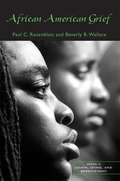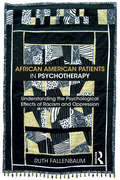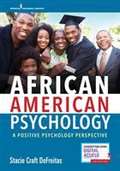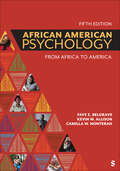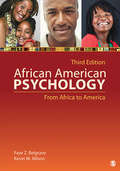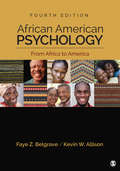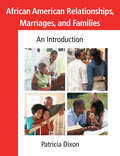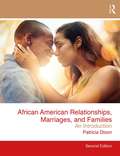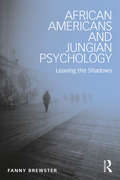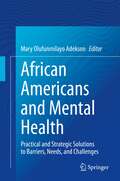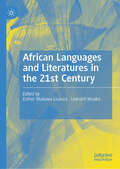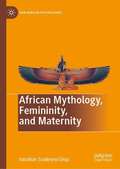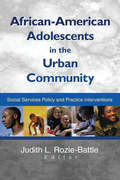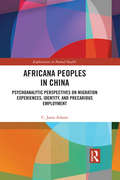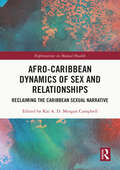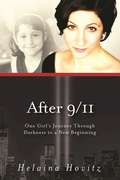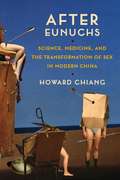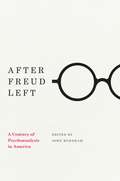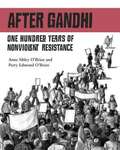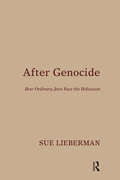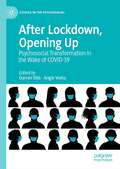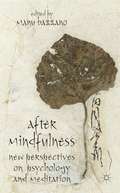- Table View
- List View
African American Grief (Series in Death, Dying, and Bereavement)
by Paul C. Rosenblatt Beverly R. WallaceAfrican American Grief is a unique contribution to the field, both as a professional resource for counselors, therapists, social workers, clergy, and nurses, and as a reference volume for thanatologists, academics, and researchers. This work considers the potential effects of slavery, racism, and white ignorance and oppression on the African American experience and conception of death and grief in America. Based on interviews with 26 African-Americans who have faced the death of a significant person in their lives, the authors document, describe, and analyze key phenomena of the unique African-American experience of grief. The book combines moving narratives from the interviewees with sound research, analysis, and theoretical discussion of important issues in thanatology as well as topics such as the influence of the African-American church, gospel music, family grief, medical racism as a cause of death, and discrimination during life and after death.
African American Patients in Psychotherapy: Understanding the Psychological Effects of Racism and Oppression
by Ruth FallenbaumAfrican American Patients in Psychotherapy integrates history, current events, arts, psychoanalytic thinking, and case studies to provide a model for understanding the social and historical dimensions of psychological development across African American communities. Among the topics included are psychological consequences of slavery and Jim Crow, the black patient and the white therapist, the toll of even “small” racist enactments, the black patient’s uneasy relationship with health care providers, and a revisiting of the idea of “black rage.” Author Ruth Fallenbaum also examines the psychological potential of reparation for centuries of slave labor and legalized wage and property theft.
African American Psychology: A Positive Psychology Perspective
by Stacie DeFreitasThis innovative text is the first to examine the contemporary psychological experience of African Americans through the lens of a positive, strengths-based model. It combats the deficit perspective that has permeated the psychological literature about African Americans by focusing on the strengths that have facilitated their growth and resilience--while also considering existing challenges and struggles. The author examines in depth the major areas of psychological research across family, peer, and romantic relationships, education, work, ethnic-racial socialization and identity, prosocial behavior and civic engagement, and the mental and physical health of African Americans today. With a focus on real life applications, the text includes pedagogical elements introducing topics in Current Events, Interventions in Practice, Individual Issues, African Cultural Values, and Media and Technology. Additional features include learning objectives in each chapter, discussion questions, a closing summary, an extensive trove of additional resources, and PowerPoints and a sample syllabus for instructors. Print version of book includes free, searchable, digital access to the entire contents.
African American Psychology: From Africa to America
by Faye Z. Belgrave Kevin W. Allison Camilla W. NonterahAfrican American Psychology: From Africa to America provides a comprehensive and integrated introduction to the field. The Fifth Edition presents recent advances and developments in African American psychology, including new coverage of systematic and institutional racism, Black empowerment, COVID-19′s impact on Black communities, and increased attention to heterogeneity within the Black community.
African American Psychology: From Africa to America
by Faye Z. Belgrave Kevin W. Allison Camilla W. NonterahAfrican American Psychology: From Africa to America provides a comprehensive and integrated introduction to the field. The Fifth Edition presents recent advances and developments in African American psychology, including new coverage of systematic and institutional racism, Black empowerment, COVID-19′s impact on Black communities, and increased attention to heterogeneity within the Black community.
African American Psychology: From Africa to America
by Dr Faye Z. Belgrave Dr Kevin W. AllisonAfrican American Psychology: From Africa to America provides students with comprehensive coverage of African American psychology as a field. Authors Faye Z. Belgrave and Kevin W. Allison expertly convey the integration of African and American influences on the psychology of African Americans. They illustrate how this group’s contemporary values, beliefs, and behaviors are derived from African culture and translated by the cultural socialization experiences of African Americans in this country. The text provides examples of evidence-based practices for improving well-being among African American communities, and addresses key methodological and research issues that are relevant to conducting research in this field. Each chapter of the text further addresses a contemporary issue of African Americans and provides a critical analysis of literature and research on select topics.
African American Psychology: From Africa to America
by Faye Z. Belgrave Kevin W. AllisonAfrican American Psychology: From Africa to America, Fourth Edition provides comprehensive coverage of the field of African American psychology. Authors Faye Z. Belgrave and Kevin W. Allison skillfully convey the integration of African and American influences on the psychology of African Americans using a consistent theme throughout the text—the idea that understanding the psychology of African Americans is closely linked to understanding what is happening in the institutional systems in the United States. The Fourth Edition reflects notable advances and important developments in the field over the last several years, and includes evidence-based practices for improving the overall well-being of African American communities. New to the Fourth Edition Coverage of current issues affecting African Americans and causing changes in the social-political environment include the Black Lives Matter movement, racial trauma, and more. Content from blogs has been added to chapter-opening cover stories to reflect the more modern ways news and information are obtained. More coverage of literature and research on Blacks throughout the diaspora, especially in Africa, provide historical context and documents heterogeneity among African Americans in the United States. Expanded coverage of topics as a result of recent research includes LGBTQ individuals, African American fathers, colorism, intersectionality, electronic cigarettes, social media, and more.
African American Psychology: From Africa to America
by Faye Z. Belgrave Kevin W. AllisonAfrican American Psychology: From Africa to America, Fourth Edition provides comprehensive coverage of the field of African American psychology. Authors Faye Z. Belgrave and Kevin W. Allison skillfully convey the integration of African and American influences on the psychology of African Americans using a consistent theme throughout the text—the idea that understanding the psychology of African Americans is closely linked to understanding what is happening in the institutional systems in the United States. The Fourth Edition reflects notable advances and important developments in the field over the last several years, and includes evidence-based practices for improving the overall well-being of African American communities. New to the Fourth Edition Coverage of current issues affecting African Americans and causing changes in the social-political environment include the Black Lives Matter movement, racial trauma, and more. Content from blogs has been added to chapter-opening cover stories to reflect the more modern ways news and information are obtained. More coverage of literature and research on Blacks throughout the diaspora, especially in Africa, provide historical context and documents heterogeneity among African Americans in the United States. Expanded coverage of topics as a result of recent research includes LGBTQ individuals, African American fathers, colorism, intersectionality, electronic cigarettes, social media, and more.
African American Relationships, Marriages, and Families
by Patricia DixonAfrican American Relationships, Marriages, and Families is a historically and culturally centered text designed for relationship, marriage and family educators and therapists who work with African American singles and couples. Complete with numerous exercises, the book helps singles and couples increase their self-awareness, partner awareness and respect, and appreciation for difference. It also helps foster effective communication and conflict resolution skills, showing readers how to develop and maintain healthy relationships, marriages, and families. No ground is left uncovered in Dixon's thoughtful and considered analysis.
African American Relationships, Marriages, and Families: An Introduction
by Patricia DixonAfrican American Relationships, Marriages, and Families, Second Edition is a historically and culturally centered research-based text designed for use in undergraduate, graduate, and community-based courses on African American relationships, marriages, and families. Complete with numerous exercises, this volume can be used by current and future helping professionals to guide singles and couples by increasing single and partner-awareness, and respect and appreciation for difference. In addition, singles and couples learn skills for effective communication and conflict resolution and ultimately how to develop and maintain healthy relationships, marriages, and families. This second edition includes updates and revisions to current chapters and also features two new chapters: one on parenting and one on same-gender loving/LGBTQ.
African Americans and Jungian Psychology: Leaving the Shadows
by Fanny BrewsterAfrican Americans and Jungian Psychology: Leaving the Shadows explores the little-known racial relationship between the African diaspora and C.G. Jung’s analytical psychology. In this unique book, Fanny Brewster explores the culture of Jungian psychology in America and its often-difficult relationship with race and racism. Beginning with an examination of how Jungian psychology initially failed to engage African Americans, and continuing to the modern use of the Shadow in language and imagery, Brewster creates space for a much broader discussion regarding race and racism in America. Using Jung’s own words, Brewster establishes a timeline of Jungian perspectives on African Americans from the past to the present. She explores the European roots of analytical psychology and its racial biases, as well as the impact this has on contemporary society. The book also expands our understanding of the negative impact of racism in American psychology, beginning a dialogue and proposing how we might change our thinking and behaviors to create a twenty-first-century Jungian psychology that recognizes an American multicultural psyche and a positive African American culture.African Americans and Jungian Psychology: Leaving the Shadows explores the positive contributions of African culture to Jung’s theories and will be essential reading for analytical psychologists, academics and students of Jungian and post-Jungian studies, African American studies, and American studies.
African Americans and Mental Health: Practical and Strategic Solutions to Barriers, Needs, and Challenges
by Mary Olufunmilayo AdeksonThis book enumerates the unique challenges, barriers, needs, and trauma of being an African American in the United States, and at the same time highlights what needs to be done to improve and foster the mental health healing of this population. This includes practical applications and strategic solutions that work, such as the family togetherness and ardent spiritual beliefs that form the basis for resilient and vibrant mental health among African Americans. This contributed volume features the authorship of counseling professionals, most of whom are African American themselves. Because of their own personal experiences, they are able to emphasize cogent helping strategies for this population, to show how to move forward with encouragement. The book also highlights ways to promote life that is mentally healthy and holistic for African Americans.Topics covered within the chapters include:Mental Health Challenges Unique to African American Children and AdolescentsDiagnosis Issues with African Americans Culture of Family Togetherness, Emotional Resilience, and Spiritual Lifestyles Inherent in African Americans from the Time of Slavery Until Now The Trauma of Being an African American in the 21st Century Training, Recruiting, and Retaining African American Mental Health ProfessionalsAfrican Americans and Mental Health: Practical and Strategic Solutions to Barriers, Needs, and Challenges is an essential resource for helping professionals who work with this population, including psychiatrists, counselors, psychologists, social workers, and other mental health professionals. The book also should be of interest to researchers, instructors, and students in Counseling, Social Work, and Psychology.
African Languages and Literatures in the 21st Century
by Esther Mukewa Lisanza Leonard MuakaThis edited book examines the crucial role still played by African languages in pedagogy and literatures in the 21st century, generating insights into how they effectively serve cultural needs across the African continent and beyond. Boldly positioning African languages as key resources in the 21st century, chapters focus on themes such as language revolt by marginalized groups at grassroots level, the experience of American students learning African languages, female empowerment through the use of African languages in music, film and literary works, and immigration issues. The contributions are written by scholars of language, literature, education and linguistics, and the book will be of interest to students and scholars in these and related areas.
African Mythology, Femininity, and Maternity (Pan-African Psychologies)
by Ismahan Soukeyna DiopThis book explores feminine archetypes and mythological figures in African and European traditions with an underlying goal of describing the foundations of social status for women. The author provides a rich corpus of mythology and tales to illustrate aspects of female and mother-daughter relationships. Diop analyzes the symbolic aspects of maternity and femininity, describing the social meaning of the matrix, breasts, and breastfeeding. A retrospective of female characters in African literature brings an interesting approach to explore the figures of femininity and maternity in society. After an extensive analysis of African mythology and tales, the author proposes a way to integrate them in the clinical psychotherapy as a projective material. The analysis of clinical cases offers an example of how this material can be used in therapy with women from African descent.
African-American Adolescents in the Urban Community: Social Services Policy and Practice Interventions
by Judith Rozie-BattleBecome a more effective social worker with this outstanding volume on inner-city urban youth! African-American Adolescents in the Urban Community: Social Services Policy and Practice Interventions examines contemporary issues confronting African-American youth. It highlights key areas such as health, education, the criminal justice system, and youth development strategies. An essential overview of the status of urban African-American youth for students, professionals working with this important population, and policymakers, this vital book proposes policy and programming considerations for today and for the future.African-American Adolescents in the Urban Community is a one-stop view of: ways to help African-American youth experience responsibility and community involvement health concerns of this population, including teen pregnancy, alcohol and drug addiction, and limited access to health care the challenges that lie ahead for African-American girls, including crime, poverty, poor self-esteem, and peer pressure ways to help teenage fathers meet their financial and emotional obligations to their families police and prosecutorial policies that need to be examined and challenged to end the perception of a racially unjust system and much more
Africana People in China: Psychoanalytic Perspectives on Migration Experiences, Identity, and Precarious Employment (Explorations in Mental Health)
by C. Jama AdamsThis book examines the psychosocial experiences of foreign workers from Africa and its diaspora in China, within the context of international socio-economic forces. By exploring employment-based migration from a psychoanalytic perspective, this volume investigates the utility of adaptive ambivalence and the challenges that migrant workers face around issues of self-development, agency, and identity. Through a careful analysis of interviews with Africana people, the author demonstrates that the capacity to be reflective and resilient alongside having a strong and diversified support network are crucial for the psychological well-being of those living and working in unfamiliar geographic and cultural conditions.
Afro-Caribbean Dynamics of Sex and Relationships: Reclaiming the Caribbean Sexual Narrative (Explorations in Mental Health)
by Morgan Campbell, Kai A. D.Afro-Caribbean Dynamics of Sex and Relationships: Reclaiming the Caribbean Sexual Narrative examines the complexities of sexuality and relationships in the Caribbean, shaped by colonial legacies, cultural norms, and evolving gender roles.Through seven original research studies, it explores a wide range of topics related to sexuality and intimate relationships, including body image and sexual satisfaction, sexual socialization and communication, perceptions of unconventional relationships, the psychological impact of adverse childhood experiences on intimate relationships, family structure’s influence on sexual identity, sexual decision-making among Caribbean youth, and the intersections of mental health, trauma, and intimacy. This book challenges Eurocentric narratives, offering a culturally grounded framework for understanding Afro-Caribbean sexuality.Bridging psychology, sociology, and history, it is essential reading for scholars, researchers, and academics in gender, sexuality, Caribbean studies, and postcolonial mental health.
After 9/11: One Girl's Journey through Darkness to a New Beginning
by Jasmin Lee Cori Helaina Hovitz“You are a herald for your generation....Thank you for using your voice to help us make sense of that dark day, and forge a new beginning.”—Hillary Rodham Clinton, in a letter to Helaina Hovitz Helaina Hovitz was twelve years old and in middle school just blocks away when the World Trade Center was attacked. Her memoir encapsulates the journey of a girl growing up with PTSD after living through the events firsthand. After 9/11 chronicles its effects on a young girl at the outset of adolescence, following her as she spirals into addiction and rebellion, through loss, chaos, and confusion.The events of 9/11 were a very real part of Helaina’s life and are still vivid in her memory today. Hundreds were stranded in the neighborhood, including Helaina, without phones or electricity or anyone to help. Fear and despair took over her life. It would take Helaina more than a decade to overcome the PTSD — and subsequent alcohol addiction — that went misdiagnosed and mistreated. In many ways, After 9/11 is the story of a generation growing up in the aftermath of America’s darkest day —and for one young woman, it is the story of a survivor who, after witnessing the end, got to make a new beginning. This new trade paperback edition includes tips on how to cope with trauma, an FAQ section, and a guide to discussing 9/11 with children. “Inspirational, courageous and beautifully told. After 9/11 is a testament to the resiliency of the human spirit.” — Cathy Free, correspondent, PEOPLE magazine“Helaina Hovitz's engrossing narrative begins in the shadow of the twin towers with her as a backpack-toting twelve-year-old and plays out over the next fifteen years in dramatic - and sometimes distressing - detail. This impressive debut is both deeply evocative and intensely personal.” — Peter Canby, Senior Editor, The New Yorker“A moving and remarkable testament to a time that changed our country, told beautifully by a young woman who never gave up hope that she could reclaim her life, no matter how grim things looked.” — Sean Elder, contributor, Newsweek
After Effects: A Memoir of Complicated Grief
by Andrea GilatsAn intensely moving and revelatory memoir of enduring and emerging from exceptional grief To grieve after a profound loss is perfectly natural and healthy. To be debilitated by grief for more than a decade, as Andrea Gilats was, is something else. In her candid, deeply moving, and ultimately helpful memoir of breaking free of death&’s relentless grip on her life, Gilats tells her story of living with prolonged, or &“complicated,&” grief and offers insight, hope, and guidance to others who suffer as she did. Thomas Dayton, Andrea Gilats&’s husband of twenty years, died at 52 after a five-month battle with cancer. In After Effects Gilats describes the desolation that followed and the slow and torturous twenty-year journey that brought her back to life. In the two years immediately following his death, Gilats wrote Tom daily letters, desperately trying to maintain the twenty-year conversation of their marriage. Excerpts from these letters reveal the depth of her despair but also the glimmer of an awakening as they also trace a different, more typical course of the grief experienced by one of Gilats's colleagues, also widowed. Gilats&’s struggle to rescue herself takes her through the temptation of suicide, the threat of deadly illness, the overwhelming challenges of work, and the rigor of learning and eventually teaching yoga, to a moment of reckoning and, finally, reconciliation to a life without her beloved partner. Her story is informed by the lessons she learned about complicated grief as a disorder that, while intensely personal, can be defined, grappled with, and overcome.Though complicated grief affects as many as one in seven of those stricken by the loss of a close loved one, it is little known outside professional circles. After Effects points toward a path of recuperation and provides solace along the way—a service and a comfort that is all the more timely and necessary in our pandemic-ravaged world of loss and isolation.
After Eunuchs: Science, Medicine, and the Transformation of Sex in Modern China
by Howard ChiangFor much of Chinese history, the eunuch stood out as an exceptional figure at the margins of gender categories. Amid the disintegration of the Qing Empire, men and women in China began to understand their differences in the language of modern science. In After Eunuchs, Howard Chiang traces the genealogy of sexual knowledge from the demise of eunuchism to the emergence of transsexuality, showing the centrality of new epistemic structures to the formation of Chinese modernity.From anticastration discourses in the late Qing era to sex-reassignment surgeries in Taiwan in the 1950s and queer movements in the 1980s and 1990s, After Eunuchs explores the ways the introduction of Western biomedical sciences transformed normative meanings of gender, sexuality, and the body in China. Chiang investigates how competing definitions of sex circulated in science, medicine, vernacular culture, and the periodical press, bringing to light a rich and vibrant discourse of sex change in the first half of the twentieth century. He focuses on the stories of gender and sexual minorities as well as a large supporting cast of doctors, scientists, philosophers, educators, reformers, journalists, and tabloid writers, as they debated the questions of political sovereignty, national belonging, cultural authenticity, scientific modernity, human difference, and the power and authority of truths about sex. Theoretically sophisticated and far-reaching, After Eunuchs is an innovative contribution to the history and philosophy of science and queer and Sinophone studies.
After Freud Left: A Century of Psychoanalysis in America
by John BurnhamFrom August 29 to September 21, 1909, Sigmund Freud visited the United States, where he gave five lectures at Clark University in Worcester, Massachusetts. This volume brings together a stunning gallery of leading historians of psychoanalysis and of American culture to consider the broad history of psychoanalysis in America and to reflect on what has happened to Freud’s legacy in the United States in the century since his visit There has been a flood of recent scholarship on Freud’s life and on the European and world history of psychoanalysis, but historians have produced relatively little on the proliferation of psychoanalytic thinking in the United States, where Freud’s work had monumental intellectual and social impact. The essays in After Freud Left provide readers with insights and perspectives to help them understand the uniqueness of Americans’ psychoanalytic thinking, as well as the forms in which the legacy of Freud remains active in the United States in the twenty-first century. After Freud Left will be essential reading for anyone interested in twentieth-century American history, general intellectual and cultural history, and psychology and psychiatry.
After Gandhi: One Hundred Years of Nonviolent Resistance
by Anne Sibley O'Brien Perry Edmond O'BrienThis book explores the work of Mohandas Gandhi and his legacy through fifteen profiles of activists who chose nonviolent resistance as the path to change. The book focuses on heroic individuals who were in direct physical danger and chose to respond with nonviolence.
After Genocide: How Ordinary Jews Face the Holocaust
by Sue Lieberman2015 was the seventieth anniversary of the end of World War Two, and, for Jews, the seventieth anniversary of the end of the worst Jewish catastrophe in diaspora history. After Genocide considers how, more than two generations since the war, the events of the Holocaust continue to haunt Jewish people and the worldwide Jewish population, even where there was no immediate family connection. Drawing from interviews with "ordinary" Jews from across the age spectrum, After Genocide focuses on the complex psychological legacy of the Holocaust. Is it, as many think, a "collective trauma"? How is a community detached in space and time traumatised by an event which neither they nor their immediate ancestors experienced?"Ordinary" Jews' own words bring to life a narrative which looks at how commonly-recognised attributes of trauma - loss, anger, fear, guilt, shame - are integral to Jewish reactions to the Holocaust.
After Lockdown, Opening Up: Psychosocial Transformation in the Wake of COVID-19 (Studies in the Psychosocial)
by Darren Ellis Angie VoelaThis edited volume examines the psychosocial transformations experienced during the COVID-19 pandemic and lockdown, and envisions those that might lead to a more equitable society as we ‘open up’. The book integrates psychoanalysis, sociology, cultural studies, and psychology to address three main areas: personal experiences of the lockdown, new formations of power and desire that the lockdown has shaped, and global concerns related to the pandemic. Within those three areas, the chapters discuss key themes that include the uses of space during lockdown; experiences of death, loss, and domestic violence; race and the pandemic; technology, media, and viral media; chronic illness; handwashing and COVID-19; and conspiracy theories.Drawing together academics and practitioners with a common vision of social justice and active pedagogy, the contents of this volume combine experiential writing with cutting-edge, theoretically-informed interdisciplinary debates. The book advances and demonstrates the productive diversity of psychosocial studies, drawing on psychoanalytic theories, critical psychologies, critical theories, critical race theories, process philosophies, affect theories, and critical pedagogy. In doing so, it will appeal to scholars across the social sciences.
After Mindfulness
by Manu BazzanoThe Mindfulness phenomenon has swept the mental health field over the last two decades, helping to bring some of Buddhism's more inaccessible doctrines to a broader audience. While it would be naive to think that our instinctive human longing for the sacred can be satisfied by a diet of weekly exercises, cognitive rewiring and behavioural reprogramming, it would be equally naive to depend on 'trans-personal' and 'spiritual' guides to provide us with a pocket-sized map of our own path. Instead, we each create a path as we walk. After Mindfulness brings together well-known Buddhist writers and renowned therapists and theorists from various orientations for an appreciation and critical evaluation of Mindfulness. This unprecedented collection of expertise, ranging from clinical work to inspired commentaries on the Buddha's teachings, will greatly inspire anyone who is interested in the creative integration of psychology and meditation. "
